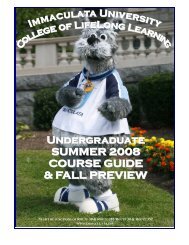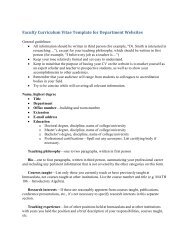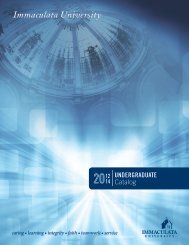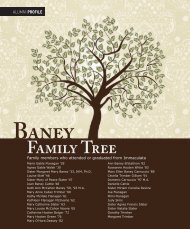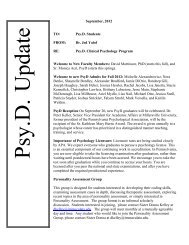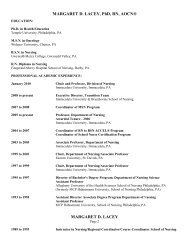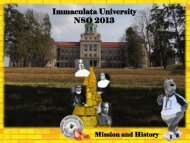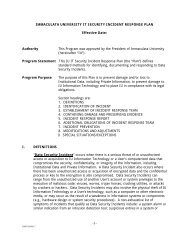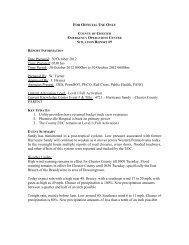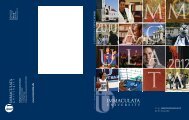8529 Cat.qxd - Immaculata University
8529 Cat.qxd - Immaculata University
8529 Cat.qxd - Immaculata University
Create successful ePaper yourself
Turn your PDF publications into a flip-book with our unique Google optimized e-Paper software.
• Computers-in-Business: Economics 203; Accounting 203-204; Business 360; Computer Science 201, 202, 207 or 208, one ofthe following: Computer Science 224, 230 or 231, 320, BUS 327.BUSINESS ADMINISTRATION101. Introduction to Business (Offered only through ACCEL ®Programs) (3)Focuses on the general concepts of business. The courseprovides an introduction to the theories and techniques used bymanagers in both day-to-day operations and long-range planning.110. Expense Management (Offered only through CorporateEducation) (1 credit /non-credit)Techniques to manage controllable expenses are underscored inthis two-day course. Managers will study new and innovativeapproaches to avoiding product shrinkage, monitoring inventory,ordering product in a timely manner, controlling shoplifting,handling cash, and training associates to conserve supplies.111. Increasing Sales (Offered only through CorporateEducation) (1 credit/non-credit)This is the capstone course for the Store Manager DevelopmentProgram. It serves to integrate and put into operation the learningfrom the other courses in the program with the goal of increasingsales.200. Special Topics in Business (1-3)Current topics which deal with on-going facets of businessadministration, accounting, finance, marketing, or economics.235. Business Computer Applications (3)Designed for exploration and development of computerapplication skills in practical business context. Computerapplications examined include Microsoft Word, Excel, PowerPoint,Access, and Microsoft Project. These applications are applied topresentations, project planning, information display and analyses.301. International Business (3)The course provides a look at the growing importance of nationsengaging in international business. Topics include global trade,global marketing, cultural dimensions, and foreign investmentactivities that companies must consider in order to compete in theglobal marketplace. (This course is offered on-line or in thetraditional format.) (Meets cross-cultural studies requirement)302. Personal Finance (3)Introduction to personal financial evaluation, management, andplanning. The course provides the student with an understanding ofconsumer credit, life insurance, health insurance, property andcasualty insurance, wills, trusts, Social Security, stocks, bonds, realestate, mutual funds, retirement planning, and other uses of funds.303. The History of American Business (3)The history of American business from colonial times to thepresent. The course offers a variety of case studies from wellknowncompanies and industries and a thematic emphasis ongovernment-business relations (See History 303).311. Human Resource Management (3)The study of the role of human resource management within anorganization. Topics include job analysis and design, employeerecruitment, selection, orientation, training, motivation,performance review, and benefits, as well as the administration oflegal and safety laws.314. Women in Business (3)Considers one of the important changes in the Americaneconomy in the 20th century: the increase in the number of womenworking. Job-related aspects, such as historical patterns,occupational segregation, education, labor supply, sexdiscrimination and gender-based wage differentials will beexamined. A comparison of the economic situation of women in theU.S. with other societies will be explored.315. Business Law I (3)Develops an understanding of the principles and doctrines of lawas they relate to commercial transactions. Explores the impacts ofjudicial decisions (Case Law) and government regulation(Administrative Law) on business decisions and management.Discussions include: major classifications of law, types of businessorganizations, contract law as the foundation of all businesstransactions, and tort law and the operation of governmentregulatory agencies.316. Business Law II (3)A study of the sources and enforcement mechanisms ofadministrative law (commonly known as government regulation) atlocal, state and federal levels with an aim for overall understandingof government administrative agencies and their impact on theoperation of American businesses. Topics include environmental,employment, financial, banking and occupational safety laws. (Thiscourse is offered on-line or in the traditional format).318. Compensation and Benefits (3)This course focuses on styles of compensation and the variousbenefits offered by employers to their employees. Compensationsuch as bases for pay and incentive plans along with legal, health,and social benefits will be presented.(This course is offered on-line or in the traditional format).320. Business of Health Care (3)An understanding of health care delivery in the U.S. from thesupply and demand side of the market. A comparative analysis withother nations will emphasize the complex nature of the health careindustry. The course explores the changing nature of health and medicalcare and the implications for medical practice and health policy.324. Entrepreneurship (3)How to start your own business: from concept to reality. Astudy of the challenges and responsibilities of an entrepreneur.Operational strategies concerning business, financial, and marketingplans, along with advertising, human resource, legal, and ethicalissues. (This course is offered on-line or in the traditional format.)327. Managing Business Information (3)A focus on the methods with which organizations access,compile, analyze, interpret and disseminate information. Thecourse examines the way in which organizations use information inthe planning, managing, and decision-making processes. Theobjective is to understand the constantly evolving role ofinformation technology in providing the tools and techniques foreffective use of management information.330. Business Seminar (3)The course begins the transition from an academic to amanagerial environment through simulation. Meetings anddiscussions will focus on topics that reflect current issues inorganization and management. The course is focused onindependent research, critical thinking, and communication skills(oral and written).42



